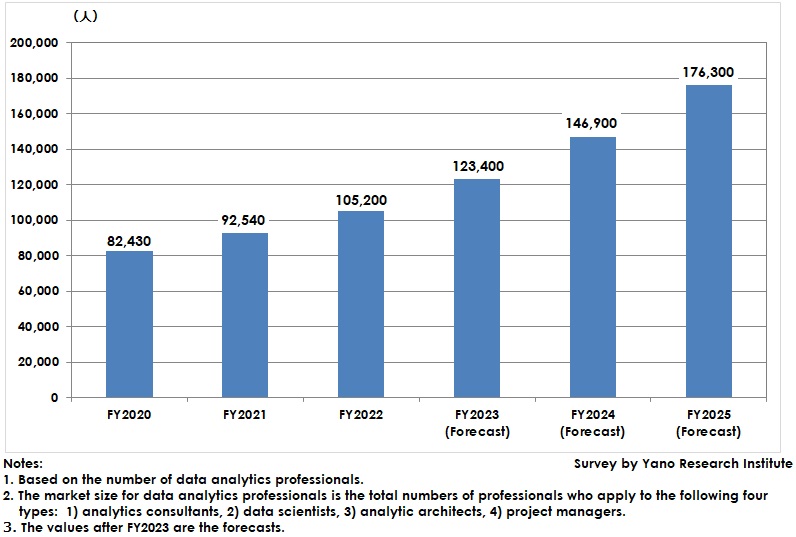No.3309
Data Analytics Professionals Market in Japan: Key Research Findings 2023
Number of Data Analytics Professionals Expected to Reach 123,400 for FY2023, and to Attain 176,300 by FY2025
Yano Research Institute (the President, Takashi Mizukoshi) carried out a survey on the domestic numbers of data analytics professionals and found out the status of recruitment, training methods, the trends of personnel by job type, and the future perspectives.

Market Overview
Companies are currently recruiting data analytics professionals centered on data scientists including AI experts, regardless of new graduates or mid-career experts. For training, there have been some curriculums established for each rank and for in-house as well as for outsourced. Competition for top talent on data analytics is intense especially over experienced talents, as companies generally lack such experts.
First, for new graduates, major IT companies have started job-oriented recruitment. Though user companies continue hiring new graduates en masse, some show a shift to job-oriented recruitment for IT personnel, and there have been some cases of data scientists and other data analytics experts being hired as specialists.
Next, for experienced personnel, companies, regardless of IT companies or user companies, are proactive in recruiting data scientists who are ready to contribute. Those user companies particularly vigorous in recruiting such personnel are manufacturers of electricity, automobiles, chemicals, pharmaceutical, and in other industries such as retailing, distribution, and finance.
For training, IT businesses tend to provide training programs for other companies, not limited to in-house, backed by higher demand for reskilling. User companies, on the other hand, are hastily preparing training programs partly by implementing the curriculums from other companies. There are companies that organize highly advanced curriculums by aligning with local universities.
As shortage of data scientists is the issue, educational institutions have started addressing production of data scientists and other data analytics professionals by establishing the faculty and graduate schools, but shortage of teachers and instructors remain unsolved.
Noteworthy Topics
Both IT Businesses and User Companies Accelerating for Attracting Highly Skilled Personnel, Former by Creating Mechanism and Latter by Organizing Multi-Layer Training Programs
IT businesses, chiefly major companies, are taking various measures to lure skilled talents. In addition to establishing unique certified qualification programs, companies show some efforts such as Hackathon participation and flexible IT environments that are used for enticing data scientists, while setting up special employment systems for fixed term employment and expensive annual salary systems according to skills to acquire top researchers.
User companies, on the other hand, position data scientists as the instructor to infiltrate data driven management that use data for decision making and business operation. They show the moves of providing training curriculums not only for data scientists bus also for all employees according to each rank, including the management, thereby to bring up data analytics professionals through multi-layer training programs.
Municipalities are also addressing recruitment and training of data analytics experts, aiming to press ahead with EBPM* throughout the organization.
*EBPM: A method of policy making, with its abbreviation “Evidence-based Policy Making”. After making clear of the objectives of the policy, policymaking is conducted based on information or data (evidence) that are important in measuring the effects of the policy.
Future Outlook
The number of domestic data analytics professionals (analytics consultants, data scientists, analytic architects, and project managers) is projected to reach 176,300 by FY2025.
All four types of the experts are likely to grow, because of increase in the numbers of data analytics projects as well as the cases of such professionals to be prepared in-house against a backdrop of promotions of digital transformation and data-driven management.
Upon propelling digital transformation projects, IT businesses seem to find it ever more important to place analytic consultants who are significant in succeeding the business, together with those specialists like data scientists and analytic architects who are closer to IT.
In association with the penetration in data-driven management, some user companies are launching a special department for data scientists and analytic architects due to higher momentum for making data analytics in-house. Not limited to the department specializing in supporting data analytics, the tendency is expanding to business units where data analytics is beginning to be used for streamlining of the business and for business launch.
Research Outline
2.Research Object: Domestic IT businesses, user companies, municipalities
3.Research Methogology: Face-to-face interviews (including online) by our expert researchers, surveys via telephone and email, and literature research
Data Analytics Professionals
Data analytics professionals in this research are categorized into the following four types that comprise a data analytics project: 1) Analytics Consultant (Involves with creating a data utilization strategy for data analytics projects) 2) Data Scientist (Involves with creating a model based on the analytics by means of data collection and programming language), 3) Analytics Architect (Involves with implementation phase of the models developed by the data scientist to a system) and 4) Project Manager (Presides over the data analytics project). The market size has been calculated based on the number of professionals who can be one of four types mentioned above.
<Products and Services in the Market>
1) analytics consultants, 2) data scientists, 3) analytic architects, 4) project managers
Published Report
Contact Us
The copyright and all other rights pertaining to this report belong to Yano Research Institute.
Please contact our PR team when quoting the report contents for the purpose other than media coverage.
Depending on the purpose of using our report, we may ask you to present your sentences for confirmation beforehand.